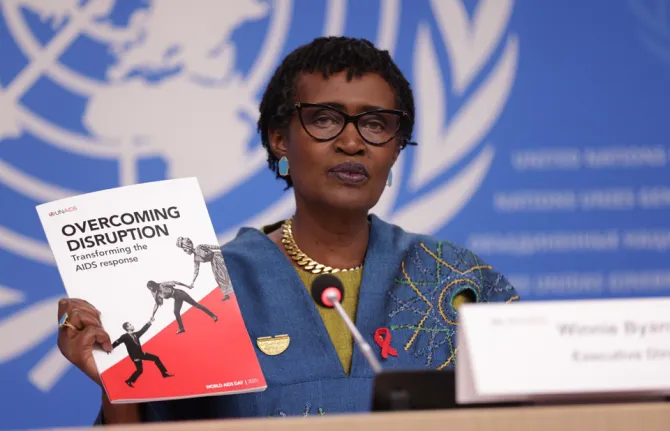UNAIDS warns of a looming HIV crisis ahead of World AIDS Day 2025

As World AIDS Day 2025 approaches, profound warnings emerge about HIV's resurgence due to drastic funding cuts. Will the global community unite to prevent a resurgence of this public health threat?
Image: UNAIDS
A stark warning from UNAIDS has illuminated a grave crisis in the global response to HIV, signalling a long-fought battle for public health at risk of unraveling. In its newly released report, Overcoming Disruption, Transforming the AIDS Response, ahead of World AIDS Day 2025, UNAIDS highlights the alarming decline in international funding, with potential repercussions that could resonate through low- and middle-income countries significantly burdened by the epidemic.
As the OECD predicts reductions in external health assistance of up to 40% by 2025 compared to 2023 levels, the repercussions are immediate and profound. Winnie Byanyima, Executive Director of UNAIDS, poignantly articulated the human impact of these statistics.
“The funding crisis has exposed the fragility of the progress we fought so hard to achieve.”
Behind the numbers are individuals—children missing crucial HIV screenings, young women deprived of preventive support, and communities left abandoned without essential services and care.
Prevention services under siege
Prevention services, already under siege prior to the financial disruptions, have sustained the most significant blow. Abrupt cuts to access to preventive medications—specifically pre-exposure prophylaxis (PrEP)—and a steep decline in voluntary medical male circumcision initiatives have widened the gap in protection for millions. The dismantling of HIV prevention programmes specifically tailored for young women deprives this demographic of vital health resources, including mental health and gender-based violence services. In 2024 alone, the statistic is staggering, with over 570 new infections occurring each day among young women and girls aged 15–24 globally.
The very foundations of community-led organisations, which have been critical in engaging the most vulnerable populations, are crumbling. A recent survey revealed that over 60% of women-led organisations have had to suspend essential programmes, significantly diminishing access to services for key populations—including men who have sex with men, sex workers, people who inject drugs, and transgender people.
The dire outlook
Failing to meet the ambitious targets set for the 2030 Global AIDS Strategy may result in an estimated 3.3 million new infections between 2025 and 2030. Compounding this crisis is a deteriorating global human rights landscape. 2025 marks the first increase in the criminalisation of same-sex sexual activity and gender expression since UNAIDS began tracking these laws in 2008, further impeding access to necessary health services.
Stirrings of hope
Yet, amidst the darkness, glimmers of hope emerge. Countries like Nigeria, Uganda, Côte d’Ivoire, South Africa, and Tanzania are stepping up, pledging to increase domestic funding for HIV services. UNAIDS is actively collaborating with over 30 nations to develop sustainability strategies aimed at maintaining essential services.
Innovation is also on the rise, with new prevention technologies poised to revolutionise the fight against HIV. New initiatives launched through partnerships involving the Gates Foundation, UNITAID, and the Global Fund promise to make vital medications available at a fraction of the current prices, aiming to provide affordable treatment options for vulnerable populations.
A call to action
As World AIDS Day approaches, UNAIDS urges global leaders to recommit to solidarity and multilateralism in the fight against HIV. A strong imperative exists to maintain funding for the regions most in need. The call for a united front against this pressing crisis cannot be underestimated.
“We know what works—we have the science, tools, and proven strategies,” said Byanyima. “What we need now is political courage.”
A momentous opportunity stands before the global community. To prevent the last decades of progress from disintegrating, there must be political resolve to invest in communities and uphold human rights—recognizing health as a fundamental human right. This is a defining moment where choices today will dictate the lives of millions tomorrow.
With over 40.8 million people living with HIV worldwide, and 9.2 million still lacking access to treatment, the urgency of action and solidarity has never been more critical.
“This is our moment to choose,” Byanyima said. “We can allow these shocks to undo decades of hard-won gains, or we can unite behind the shared vision of ending AIDS. Millions of lives depend on the choices we make today.”
Related Topics: